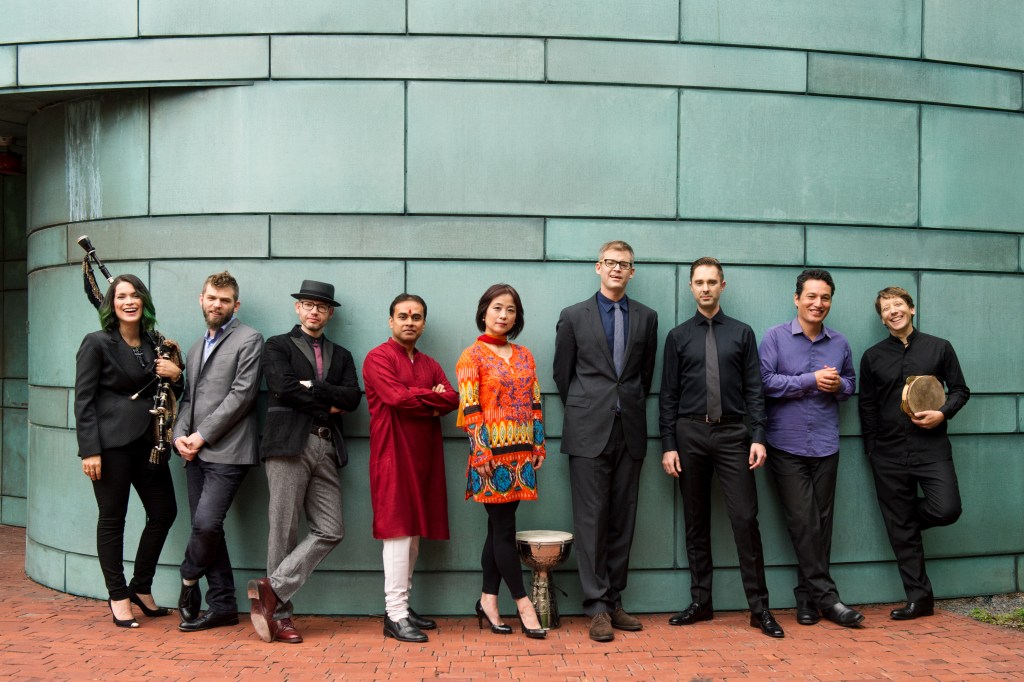Too often in this new century, we relegate the notion that music can change the world to the young. Our default image of true believers in the power of music tends toward sweaty kids pressed against the barrier at the front of the pit, their hands in the air, their young heads banging. But the search for sounds that answer an ache in the soul shouldn’t be confined to the all-night raves of one’s twenties, or even the spectacular rock shows of later years, because that would exclude unclassifiable groups like the Silkroad Ensemble, who play and experience music as if their lives — and yours — depend on it.
When they arrive at the Granada this Friday, April 26, Silkroad will perform the world premiere of an evening-length, multimedia work commissioned by UCSB Arts & Lectures called Heroes Take Their Stands. Comprising five separate works from five disparate cultures, Heroes is united by the conviction that at any given moment, each one of us has the potential to do the right thing. This program will be as passionate, as musically adventurous, and as unshakeable in its faith in the power of music as the most radical set that pounded through the giant sound systems of Coachella over the past two weekends. If you don’t see anyone down front headbanging, it’s not for lack of commitment, at least on the part of the band. (If you do see someone doing that, it will be me.)
Heroes Take Their Stands represents the culmination of two decades of world travel and intense scholarly engagement with artists working in a variety of traditions. Each segment brings in a different aspect of the Silkroad experiment in radical cross-cultural collaboration. “Elektra,” an ancient Greek myth primarily known as the source of multiple tragic dramas, has become the material for Peruvian composer/violinist Pauchi Sasaki and her team of collaborators. In addition to composing and playing music, Sasaki has a remarkable record of creating and prototyping new musical instruments, including a computer-assisted extended violin, and a wearable sound sculpture known as the “speaker dress,” which includes 96 small speakers, six amplifiers, and a variable number of microphones. For this performance, Sasaki will be working with Chinese Ink drawing animations alongside the Silkroad Ensemble musicians.
“June Snow,” by the percussionist and shinobue flute master Kaoru Watanabe, is based on a Chinese play recently translated into English by UCSB professor Frances Ya-Chu Cowhig. It’s written for Watanabe and the great pipa virtuoso Wu Man, and it reflects another fascinating side to Silkroad’s pursuit of new constellations within world music. In “Moderato 400,” pianist Jason Moran takes as his point of departure the heroic role of the Reverend Dr. Martin Luther King Jr. in the mobilization of the Montgomery Bus Boycott. Drawing on speeches and primary documents from the period, Moran has created a work that brings the evening’s theme of the heroic gesture into the immediate American past through a figure that we all venerate.
Longtime Silkroad member Kayhan Kalhor contributes a piece called “The Prince of Sorrows,” which violinist/composer Colin Jacobsen describes as the most ambitiously cinematic composition of the evening. Working with a team of animators and calligraphers, Kalhor has also supplied a recorded backing track that includes Iranian instruments the nay and the tombak to complement his specialty, the bowed string kamancheh.
Jacobsen’s own piece, “Arjuna’s Revelation,” derives from chapters in the Bhagavad-Gita that celebrate Hindu wisdom in relation to war and justice. In speaking with him about the work by phone last week, I found myself led on a mental journey that passed through the significance of rhythmic cycles of seven, both big and small, in Indian music, the importance of certain Carnatic piravi, and the fact that, late in his life, Ludwig van Beethoven read and was influenced by a German translation of the Bhagavad-Gita. To hear and be similarly moved by this extraordinary new musical amalgamation, get to the Granada on Friday.
4•1•1 | The Silkroad Ensemble performs Heroes Take Their Stands on Friday, April 26, at The Granada Theatre. For tickets and information, call 893-3535 or see artsandlectures.ucsb.edu.

